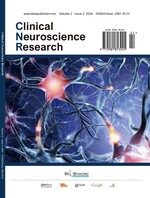Abstract
Objective: To investigate the clinical effect of minimally invasive craniotomy in the treatment of patients with cerebral hemorrhage. Methods: 58 samples of patients with cerebral hemorrhage admitted to the hospital were extracted, and the enrollment time was from January 2023 to December 2023. The patients were grouped into an observation group (n = 29) and a control group (n = 29) by using the random draw method of the numerical table. Patients in the control group underwent traditional craniotomy, while patients in the observation group underwent minimally invasive craniotomy, comparing the clinical effectiveness rate, operation time, hematoma clearance rate, rebleeding rate, hospital stay, and various functional scores between the two groups. Results: The clinical efficiency of the observation group was higher than that of the control group (P < 0.05); the operation time and hospital stay of the observation group were lower than that of the control group (P < 0.05); there was no significant difference in the hematoma clearance rate and rebleeding rate of the two groups (P > 0.05); the neurological impairment score of the observation group was lower than that of the control group after the operation, and the Barthel index of daily living score, cognitive functioning score (HDS), dementia scale score of the observation group were lower than that of the control group (P > 0.05). Dementia scale scores (HDS) were higher than those of the control group (P < 0.05). Conclusion: Minimally invasive craniotomy is effective in the treatment of patients with cerebral hemorrhage, which can shorten the operation time and hospital stay, improve the recovery of neurological function and daily living ability, and is suitable to be promoted and applied in medical institutions.
References
Cheng K, Fang XQ, Cheng B, et al., 2023, Efficacy of Minimally Invasive Neuroendoscopic Surgery Versus Standard Bone Window Craniotomy for Hematoma Removal in the Treatment of Hypertensive Cerebral Hemorrhage in the Elderly and the Effect on Inflammatory Indices. Chinese Journal of Gerontology, 43(15): 3698–3700.
Wu M, 2024, Clinical Efficacy of Minimally Invasive Surgery Versus Traditional Craniotomy in the Treatment of Hypertensive Cerebral Hemorrhage in the Basal Ganglia Region. Journal of Beihua University (Natural Science Edition), 25(2): 214–218.
Xu HQ, Yang Y, 2024, A Controlled Study on the Application of Ultra-Early Minimally Invasive Cerebral Hemorrhage Removal with Small Bone Window Versus Conventional Open Hematoma Removal in Hypertensive Cerebral Hemorrhage. Modern Medicine and Health Research (Electronic Edition), 8(4): 49–52.
Wang G, Wang Q, Dang L, 2023, Comparison of the Efficacy of Minimally Invasive Drilling Hematoma Puncture and Drainage under Frontal Approach Compared with Traditional Craniotomy in the Treatment of Hypertensive Cerebral Hemorrhage Patients. Sichuan Journal of Physiological Sciences, 45(9): 1691–1693.
Chen SD, Liu PP, 2024, Comparison of Clinical Efficacy between Minimally Invasive Neuroendoscopic Surgery and Small Bone Window Craniectomy with Hematoma Removal in the Treatment of Hypertensive Cerebral Hemorrhage. Primary Medical Forum, 28(7): 19–21 + 34.
Li YK, Sha Y, 2023, Comparison of the Effects of Minimally Invasive Neuroendoscopic Surgery and Small-Bone Window Craniotomy Microsurgery in the Treatment of Supratentorial Hypertensive Cerebral Hemorrhage. Systemic Medicine, 8(1): 151–154.
Luo WT, Zhao SQ, Song YH, 2023, Comparison of the Efficacy of Minimally Invasive Soft-channel Puncture Hematoma Drainage and Open Debridement Hematoma Removal in the Treatment of Hypertensive Cerebral Hemorrhage. Sichuan Journal of Physiological Sciences, 45(3): 489–491.
Zhou DF, 2023, Clinical Efficacy of Minimally Invasive Treatment of Basal Ganglia Cerebral Hemorrhage and Craniotomy in Patients with Hypertensive Cerebral Hemorrhage. Clinical Research, 31(1): 19–22.
Zhai XL, Zhou DZ, Liu DH, et al., 2022, A Randomized Controlled Study of Minimally Invasive Suction-assisted Undelayed Cranial Decompression for Primary Cerebral Hemorrhage with Cerebral Hernia. Journal of Practical Medicine, 38(11): 1328–1332.
Zhang GL, Li SP, Li Q, et al., 2023, Clinical Effects of Minimally Invasive Neuroendoscopic Surgery and Small Bone Window Craniotomy Microsurgery for Supratentorial Hypertensive Cerebral Hemorrhage. Life Science Instrumentation, 21(2): 74.
